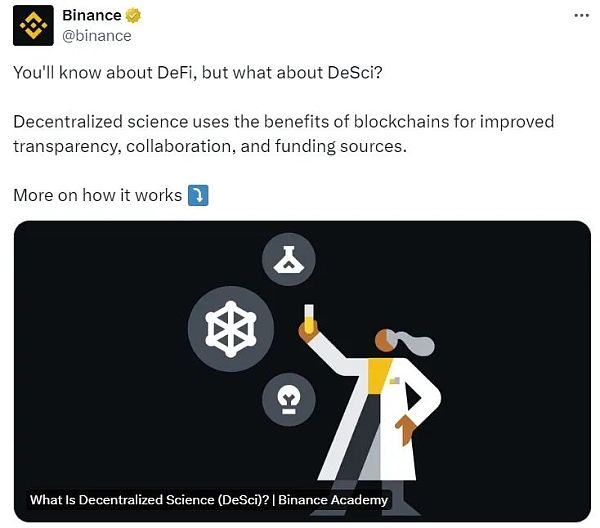Source: Web3 Xiaolu
DeSci has actually been a topic of concern to crypto leaders, such as CZ’s enthusiasm for Biotech, ResearchHub, the DeSci project founded by Brian Armstrong, and Coinbase CTO Balaji’s enthusiasm for Biotech. ; Funding from VitaDAO and so on.
There are not many DeSci projects on the market, and people in the industry are often biased. However,We think this time is really different. With the popularization of Web3 technology and the increase in public acceptance, the logic of superimposed DePin and AI can be perfectly grafted on the DeSci project. DeSci will start in 2024. A year, even though the road has been long.
The following is a compilation of articles from Binance Academy : What Is Decentralized Science (DeSci)? For your reference, to help you further understand DeSci and think about how to graft Web3 to Go to your own Science project.
 (https://twitter.com/binance/status/1769121532033306845)
(https://twitter.com/binance/status/1769121532033306845)
Core point:
DeSci is a movement that aims to leverage Web3 technology to build public infrastructure to support scientific research.
Compared with traditional scientific research, DeSci allows for diverse funding sources, review-free collaboration, and open source access to scientific data.
By leveraging Web3 blockchain technology, DeSci has the potential to make science more decentralized, transparent, and accessible.
Decentralized Science (DeSci) has become a movement that uses Web3 technology to change and innovate traditional scientific research. In this article, we'll look at what DeSci is, some of its use cases, and how it differs from traditional science.
1. What is DeSci ?
DeSci is a project that aims to leverage Web3 technology to build public infrastructure (fundraising, publishing, review, open data, commercial ization, etc.) to support scientific research movements and try to change and innovate traditional science. DeSci does not rely on centralized institutions and intermediaries, but implements decentralized knowledge creation and dissemination practices to promote knowledge sharing and scientific progress.
Essentially, DeSci aims to expand access to scientific data, promote a more transparent peer review process, and incentivize international collaboration among researchers. By leveraging Web3 blockchain technology, DeSci can ensure the integrity and immutability of scientific records while removing barriers to entry.
2. DeSci’s improvement of traditional science
DeSci uses Web3 technology to solve traditional Core issues of science, including:
2.1 FundingRaising and Allocation
< /p>
DeSci can completely change the monopoly problems in the previous collection and distribution of research funds through mechanisms such as crowdfunding, secondary donations, and decentralized autonomous organizations (DAO), thus promoting a more equitable distribution of resources.
2.2 Improving Accessibility
DeSci improves accessibility through a blockchain-based database. This ensures that scientific data and publications are transparently stored on a decentralized ledger, making them more accessible. Smart contracts can manage access to data, ensuring it is distributed fairly and securely.
2.3 Incentives
DeSci can introduce repeatability incentives such as token rewards and reputation systems. For example, smart contracts can promote a transparent and verifiable peer review process and incentivize researchers to conduct reproducible scientific work, which often improves the reliability of scientific discoveries.
3. The reality of DeSci Use cases
3.1 < strong>Academic Publishing
Some DeSci platforms can provide decentralized databases for academic publications. Researchers can publish their research results directly on these platforms, facilitating wider access to scientific results and knowledge.
3.2 Research Funding
A decentralized funding mechanism driven by smart contracts can facilitate Transparent allocation of research funds. DeSci can leverage a decentralized network to crowdfund research projects and reward contributors based on the quality of their work.
3.3 Data Sharing and Collaboration
The DeSci platform promotes security and transparency among scientists share research data and resources. This may help researchers tokenize and monetize their data while ensuring ownership.
3.4 Peer Review
Blockchain-based reputation system can improve scientific publications credibility and trustworthiness. DeSci can leverage blockchain technology to create an immutable record of researchers’ contributions and peer review activities, thereby promoting transparency and accountability in scholarly communications.
4. Decentralized science vs Traditional science
Although DeSci and traditional science Both advance knowledge and solve real-world problems, but they differ in some key ways.
4.1 Transparency and Trust
DeSci promotes transparency and trust, often through blockchain technology , ensuring the integrity and immutability of the scientific record. In contrast, traditional science often relies on central agencies to validate research results.
4.2 Accessibilityand Inclusion
The DeSci platform can facilitate scientific data and publishing Open access to materials and democratize access to knowledge. The TradSci publishing model often involves subscription fees and access barriers that often limit the dissemination of research results.
4.3 Collaboration and Innovation
DeSci often promotes collaboration and allows researchers to use Blockchain technology interacts and shares resources. Traditional scientific practices are often siled by institutional frameworks, which can hinder collaboration.
4.4 Funding and Incentives
DeSci leverages a decentralized funding mechanism to incentivize contributions and reward researchers based on the quality of their work. In contrast, funding for traditional science often relies on funding agencies and institutional budgets, which can lead to inefficiencies.
5. Conclusion
DeSci has the potential to change the scientific landscape, foster collaboration and accelerate discovery. By employing decentralized technology, DeSci can democratize access to knowledge, increase transparency, and drive innovation in every field of research.
 JinseFinance
JinseFinance
 JinseFinance
JinseFinance JinseFinance
JinseFinance JinseFinance
JinseFinance JinseFinance
JinseFinance JinseFinance
JinseFinance JinseFinance
JinseFinance JinseFinance
JinseFinance JinseFinance
JinseFinance JinseFinance
JinseFinance Cointelegraph
Cointelegraph